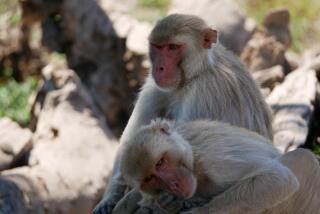Macaque genome is decoded
- Share via
A team of researchers has deciphered the genome of the rhesus macaque, one of the most widely used primates in medical research because it is susceptible to many of the diseases that attack humans.
Coming two years after the sequencing of the chimpanzee genome, the feat, reported today in the journal Science, provides new insight into what makes humans human.
“It allows us to learn what has been added or deleted in primate evolution from the rhesus macaque to the chimpanzee to the human,” said geneticist Richard A. Gibbs of Baylor College of Medicine in Houston, who led the team.
“Comparing our genome with the genome of other organisms is crucial to identifying what makes the human genome unique,” said Dr. Francis S. Collins, director of the National Human Genome Research Institute, which sponsored the project.
Macaques join a growing genome list that includes not only humans and chimps, but also mice, rats, dogs, cows, honeybees, sea urchins, roundworms and yeast.
When researchers had only human and chimp genomes to compare, they found it difficult to tell which human genes have been conserved through evolution and which have changed since the two species’ lineages split, about 6 million years ago. By expanding the comparison to the macaque, which diverged from the human-chimpanzee lineage about 25 million years ago, much more information becomes available, Gibbs said.
Macaques and humans share about 93% of their genetic information.
The team found about 200 genes that probably play a role in the differentiation between humans and monkeys, including genes involved in hair formation, immune response, membrane proteins and sperm-egg fusion. They also found several genes unique to monkeys whose functions are not known.
One surprise from the study was that several mutated genes that cause disease in humans do not do so in monkeys. About one in 14,000 humans, for example, is born with a mutated gene that causes phenylketonuria, the inability to metabolize an amino acid called phenylalanine common in food. The amino acid accumulates in their bodies, causing mental retardation and other problems.
Macaques, however, carry the mutated form of the gene and it causes them no problems.
The monkeys also carry mutated forms of the genes that cause cystic fibrosis and some blood diseases in humans, the team found.
“This is a real stunner,” Collins said.
Macaques also were found to have nearly three times as many genes controlling their immune system as do humans. That may be important, Gibbs said, because the animals are widely used for testing new vaccines.
The sequencing work was performed at Baylor, the school of medicine at Washington University in St. Louis, and the J. Craig Venter Institute in Rockville, Md. More than 170 researchers at 35 institutions then compiled the information and compared it with other genomes.
Researchers are now decoding the genomes of the marmoset, gorilla, orangutan and gibbon, which should make the evolutionary pathways of genes much clearer.






